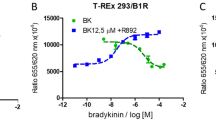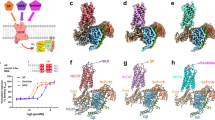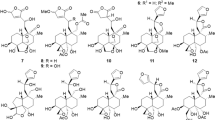Abstract
IN the past there has been much speculation about the effect of the incorporation of D-amino-acids into biologically active peptides. Several of the antibiotic peptides, as well as penicillin, contain D-amino-acids. The antibacterial activity may be associated with the presence of these D-amino-acids. In the case of the peptide hormones, where all the amino-acids are of the L series, the replacement of one amino-acid by the D isomer has usually failed to destroy the biological activity. Thus hormonal activity of bradykinin was retained when either serine1 or one of the phenylalanines2 was changed to the D-configuration. In angiotensin, inversion of arginine3, aspartic acid4, or phenylalanine5 did not destroy the biological activity, although the D-tyrosine analogue was inactive5. Examination of melanophore stimulating hormone (MSH)6,7 and eledoisin8 has shown that the biological activity was retained when one amino-acid was changed to the D-configuration. In contrast to these data on the change of a single residue, the inversion of all the amino-acid residues in a pentapeptide which has the hormonal activity of MSH was found not only to cause loss of hormonal activity, but to produce an antimetabolite of MSH9. This peptide, D - histidyl - D - phenylalanyl - D - arginyl - D - tryptophylglycine, was found to antagonize the action of the corresponding all-L pentapeptide as well as that of MSH. Because we have been attempting to make specific antimetabolites of bradykinin10, and because there is as yet no general method for prediction of the structural alterations required to make antimetabolites of peptides, we have synthesized all-D-bradykinin and tested it for biological activity in an effort to find out whether the inversion of all the amino-acids of a peptide may be a generally applicable method for the synthesis of specific peptide antagonists.
This is a preview of subscription content, access via your institution
Access options
Subscribe to this journal
Receive 51 print issues and online access
$199.00 per year
only $3.90 per issue
Buy this article
- Purchase on Springer Link
- Instant access to full article PDF
Prices may be subject to local taxes which are calculated during checkout
Similar content being viewed by others

References
De Wald, H. A., Craft, M. K., and Nicolaides, E. D., J. Med. Chem., 6, 741 (1963).
Nicolaides, E. D., Craft, M. K., and De Wald, H. A., J. Med. Chem., 6, 524 (1963).
Havinga, E., Schattenkerk, C., Visser, G. H., and Kerling, K. E. T., Rec. Trav. Chim., 83, 672 (1964).
Hess, H.-J., and Constantine, J. W., J. Med. Chem., 7, 602 (1964).
Schwyzer, R., Pure and App. Chem., 6, 265 (1963).
Li, C. H., Schnabel, E., and Chung, D., J. Amer. Chem. Soc., 82, 2062 (1960).
Lee, T. H., and Buettner-Janusch, V., J. Biol. Chem., 238, 2012 (1963).
Bernardi, L., Bosisio, G., Chillemi, F., de Caro, G., de Castiglione, R., Erspamer, V., Glaesser, A., and Goffredo, D., Experiential, 20, 306 (1964).
Hano, K., Koida, M., Kubo, K., and Yajima, H., Biochim. Biophys. Acta, 90, 201 (1964).
Stewart, J. M., and Woolley, D. W., Biochem., 3, 700 (1964).
Merrifield, R. B., Biochem., 3, 1385 (1964).
Merrifield, R. B., J. Org. Chem., 29, 3100 (1964).
Schwyzer, R., Sieber, P., and Kappeler, H., Helv. Chim. Acta, 42, 2622 (1959).
Nicolaides, E. D., and De Wald, H. A., J. Org. Chem., 26, 3872 (1961).
Vane, J. R., Brit. J. Pharmacol., 12, 344 (1957).
Author information
Authors and Affiliations
Rights and permissions
About this article
Cite this article
STEWART, J., WOOLLEY, D. All-D-Bradykinin and the Problem of Peptide Antimetabolites. Nature 206, 619–620 (1965). https://doi.org/10.1038/206619b0
Issue Date:
DOI: https://doi.org/10.1038/206619b0
This article is cited by
-
The solid-phase synthesis and some properties of tetrapeptide hydrazides related to the a13–16 fragment of insulin
Chemistry of Natural Compounds (1973)
-
Synthesis and some properties of topochemical analogs of valinomycin
Chemistry of Natural Compounds (1970)
Comments
By submitting a comment you agree to abide by our Terms and Community Guidelines. If you find something abusive or that does not comply with our terms or guidelines please flag it as inappropriate.


